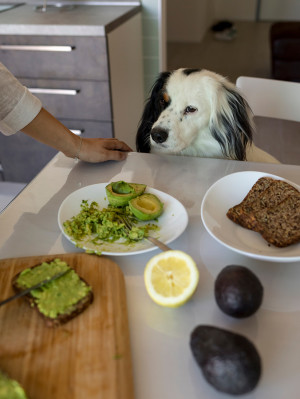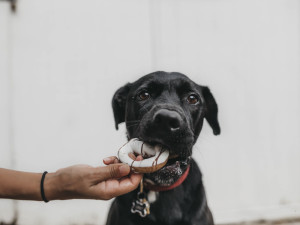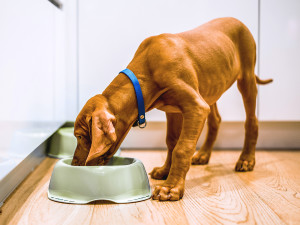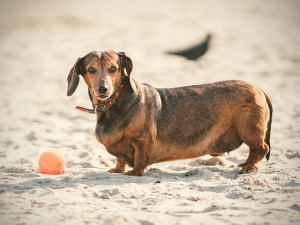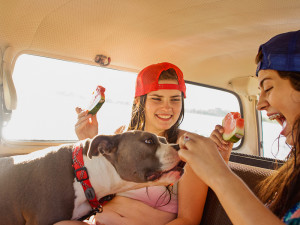Can Dogs Eat Cucumbers?
That cuke crunch is irresistible. Learn if your dog can get in on that action.
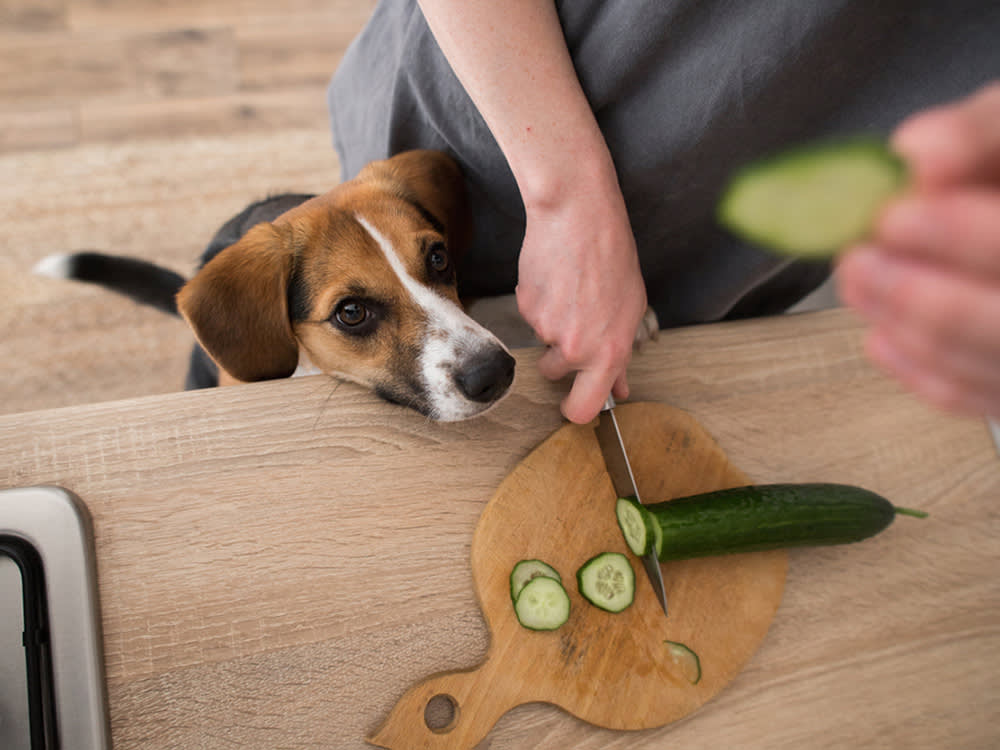
Share Article
If you, like anyone prepping for the day when we have to rely on growing our own vegetables, you probably have tried your hand at growing cucumbers. They are the perfect summer snack, add just the right amount of crunch, and look like a little cigar sticking out of your dog’s mouth when they carry one around.
But should your dog be hanging around your cucumbers? Here’s what you should know about these little pre-pickles and your pups.
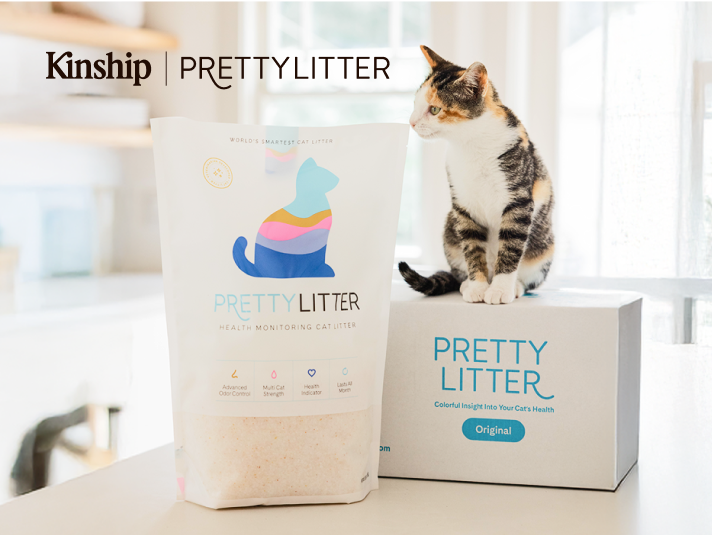
Save on the litter with color-changing tech that helps you better care for your cat.
Can dogs eat cucumbers?
Cucumbers are a safe food for dogs to snack on, in moderation. Not all dogs enjoy the texture or taste, though, and you may find your pup snubs the offer in favor of their usual treats instead. Cucumbers can have an unpredictable amount of bitterness, especially in the skin, because of a factor called cucurbitacin, which may be more or less influential in the fruit’s flavor, depending on where the cucumbers grew and the local climate.
Cukes also have many health properties that you may be familiar with from your own beauty and/or health routines, and dogs can benefit from these as well. Read on to learn all about the benefits of cucumbers for your pooch.
Nutrition Facts About Cucumbers For Dogs
The cucumber’s scientific name is Cucumis sativus, and it is a member of the gourd family. Cucumbers grow on a vine, which produces yellow flowers prior to forming the edible fruits we enjoy. There are tons of different varieties of cucumbers, and they come in all sizes, shapes and in varying shades of greens and yellows. Cucumbers contain a large amount of water making up approximately 95 percent of their weight, and giving them that refreshing juicy crunch.
They also contain potassium, phosphorus, calcium, and magnesium, all of which are vital minerals used in normal cellular function throughout the body. They contain fiber, especially in the skin, which helps to move food through the digestive tract, bulks up the poop, and prevents constipation.
They are very low in calories, largely because of their water content and can be a great way to provide small treats to your pup without adding a lot of extra calories to their daily intake. They do not contain significant amounts of protein or fat, however, which means that while they make a good refreshing snack, they do not provide much energy to the body. On days when your dog is very active, they will need a treat loaded with more protein and fat to keep up with their needs.
Are cucumbers good for dogs?
Cucumbers are good for dogs as the occasional small treat and may have some benefits to the skin when applied topically as well. It is important to remember that dogs need to get the bulk of their diet from a balanced dog food in order to get all of the nutrients they need. Be sure your dog’s primary food source is complete and balancedopens in new tab for daily nutrition and that treats make up less than ten percent of their total daily intake.
Because cucumbers have such a high water content and low-calorie count, if a dog fills up on lots of cucumbers and doesn’t eat enough of their other food, they will miss out on important nutrients as well as calories they need to maintain a healthy weight. As an occasional treat, cucumbers can be a fun way to introduce novelty and keep your pup’s snacks exciting. Here are some ways cucumbers can provide health benefits to your pup.
Hydration: Cucumbers are about 95 percent water. So, if you have a pup who loves to crunch on a juicy cucumber, you can use this treat to help keep your pup cool and hydrated on hot days. Pop some cucumber slices in the fridge for a few hours before heading outside and let your pup snack while keeping cool and getting a burst of hydration at the same time. Be sure to provide plenty of water as well, of course.
Minerals: Cucumbers contain many important minerals that are necessary for normal cellular function in the body. This includes potassium, phosphorus, calcium, and magnesium. These are all contained within your dog’s primary diet as well, so your pup likely gets plenty of these already. These minerals have critical roles in the body from heart function to healthy bones, muscles, and nerves.
Fiber: Like many vegetables, cucumbers contain fiber, especially in their skin. Fiber is a form of carbohydrate that can help to bulk up the poop and prevent constipation. Cucumbers are not as high in fiber as some other vegetables and fruits, so if you are trying to treat or prevent constipation, there may be better choices for your pup.
Low in calories: Cucumbers are mostly water, so you can imagine that they are quite low in calories. This can make them a good snack choice if your pup is overweight and you need to avoid high calorie treats. Keep in mind that all treats should be no more than ten percent of your dog’s total daily intake, but if you need to closely monitor your dog’s intake, choosing fruits and veggies that are low in calories can be a great way to continue providing fun treats without adding too many calories.
Soothes the skin: When the cucumber flesh is applied to the skin, it is thought to have cooling and soothing properties. It has been used for centuries in traditional medicine to treat sunburns, thermal burns, itchy skin, and puffy eyes. If your pup tolerates it, you can try using it for these purposes, too, by gently holding a slice of cucumber over areas of mild redness or itchiness on the skin. Be sure not to put it on any open wounds or serious injuries because it may be painful and/or introduce infection.
Can dogs eat any part of the cucumber?
In theory, yes, dogs can eat any part of the cucumber and even any part of the cucumber plant without having to worry about toxins. The whole plant, as well as the fruit, including the skin and seeds, are non-toxic to dogs. That does not necessarily mean your dog will eat any part of the cucumber, though.
Remember that cucumbers contain cucurbitacins, the compound that creates a bitter taste. This may be more or less present in the fruit itself and the skin is usually the most bitter part of the fruit. The plant is even more chock full of cucurbitacins, so the stems and leaves of the plant are especially bitter and likely very unappetizing to your pup. If you are trying to tempt your dog to try a cucumber, try peeling off the skin first and offering them just the pale fleshy part of the cucumber to see if that is more enticing.
Are cucumbers completely safe for dogs?
Cucumbers are quite safe for dogs. There are a few nuances to consider, though, and it is important to double-check with your veterinarian if your dog has any special diet considerations or underlying medical problems that may affect their snack options.
Moderation Is Key
The biggest takeaway is to remember that cucumbers should be offered in small amounts as an occasional snack. They do not contain enough calories or enough of the main nutrients dogs need to be a main part of their diet. They shouldn’t fill up on cucumbers at the expense of eating their more balanced dog food.
Risk of Intestinal Blockage
Remember to cut the cucumber into bite-sized pieces for your dog. If your dog were to swallow a large chunk of cucumber whole, there could be a risk of obstruction in the digestive tract. This would happen if a large piece got stuck within the stomach or intestines and could not pass, requiring emergency surgery. It would be rare for this to happen from a cucumber, but some dogs do not chew their food thoroughly and swallowing a large piece whole could make that a possibility.
Diuretic Properties
There are known diuretic effects from plants in the Cucumis family, including cucumbers. This means that compounds in the cucumber stimulate the body to produce and excrete urine. This is not dangerous to your dog, but it may be risky for your sofa.
If your dog eats a bunch of cucumbers, they may need more frequent walks and opportunities to pee throughout the day to avoid having accidents in the house. And try to remember not to feed them a bunch of cucumbers right before bed or a long car trip.
The bottom line: Can dogs eat human food?
While there are many human foods that are safe for dogs and may be beneficial to their health, there are some that can be toxic. Keep in mind that dogs and humans have different nutritional needs and for this reason, it is important to feed your dog a diet that is complete and balanced to meet their daily nutritional needs. In most cases, a commercially available dog food is going to be the best option for being healthy, affordable, and easily accessible.
If your dog has specific health problems, your vet might recommend a prescription diet instead. It is best to save human food for the occasional treat and to make sure that anything you feed your pup is safe for them. Be especially wary of cooked foods that may contain multiple ingredients because certain added seasonings or fats might not be safe for your pup. Stick with plain and simple snacks that you know are non-toxic.
Other Vegetables That Are Safe For Dogs
There are many other fruits and veggies that you can consider using as treats for your pup as well. It can keep things interesting for your pup to have a larger variety of treats and to be able to try things you are snacking on too. Here are some other options to consider adding to your pup’s menu:
Pumpkin contains lots of fiber, antioxidants, vitamin C, and beta-carotene, along with many other important health benefits.
Kale contains tons of nutrients including vitamin A, vitamin E, folate, manganese, thiamin, iron, potassium, phosphorus, as well as antioxidants.
Carrots contain vitamins C and K, potassium, magnesium, phosphorus, and lutein, along with antioxidants and fiber.
Other Foods That Are Potentially Dangerous
Some common human foods can be toxic to pups so it is always a good idea to double check before offering something new to your dog. For example, did you know the following foods are not considered safe for dogs?
Avocado contains a compound called persin, which is a mild toxin for dogs and may cause vomiting and diarrhea.
Xylitol is an artificial sweetener used in many human foods as well as medications. If dogs ingest it, it can cause very serious low blood sugar and/or liver failure.
Hops used in beer brewing can be very toxic if ingested by dogs. They can cause agitation, seizures, vomiting, and very high body temperatures, which can be deadly.
FAQs (People Also Ask):
How much cucumber can a dog eat?
Dogs can eat small amounts of cucumber as a treat. All treats should be no more than ten percent of your dog’s total daily intake.
Is it OK to give dogs cucumbers?
Yes; cucumber is ok for dogs in moderation. It is completely non-toxic and safe for them to eat.
Why do dogs like cucumbers?
Dogs have individual preferences for different foods. Some dogs may really like cucumber while others may refuse it. It may be appealing due to its crunchy, juicy taste.
Is cucumber good for dogs?
Cucumbers can have many benefits to dogs. It is hydrating and contains minerals which the body needs for healthy function of the heart, muscles, bones, and nerves.
Can dogs eat cucumber skin? Seeds? Plants?
Yes; the entire cucumber is non-toxic to dogs, as is the whole cucumber plant. Cucumbers contain a bitter compound which can be unappetizing to some dogs.
Are cucumbers safe for dogs?
Cucumbers are generally very safe for dogs as the occasional treat.
References
ASPCA Animal Poison Control: Toxic and Non-toxic plants: Cucumber opens in new tab
Cucurbitacin C: Bitter Principle in Cucumber plants opens in new tab
North Carolina State Extension Gardener: Cucumis sativusopens in new tab
Harvard School of Public Health: The Nutrition Source: Fiberopens in new tab
USDA Deparment of Agriculture: Cucumber with Peel opens in new tab

Dr. Amy Fox, DVM
Amy Fox, DVM is a small animal veterinarian in New York City. A lifelong animal lover, Dr. Fox studied biology in college and then worked as a veterinary nurse before pursuing veterinary school at Cornell University. She has worked in many different settings including shelter medicine, emergency medicine, general practice, and animal cruelty and forensics. She is especially interested in nutrition, preventative medicine and care for senior pets. Dr. Fox also enjoys writing about veterinary medicine and teaching. In her free time she loves to cook, garden, and go for long runs.
Related articles
![Young Female Adult Feeds Her Rottweiler mixed breed Dog]()
Wholesome Homemade Dog Food Recipes: Vet-Approved Starter Recipe
All it takes is healthy ingredients and a slow cooker.
![brown puppy eating food out of green bowl]()
A Digestible Guide to Healthy Dog Food for Your New Pup
How to pick the right grub for your dog when there are So. Many. Choices.
![A woman in a black and white striped shirt and jeans looking up ingredients from a bag of pet food on her phone in a pet store]()
What’s Actually On (and In) a Bag of Pet Food?
Want your pet to eat healthily? Dig in and learn how to read their food label.
![Close Up Of Female Owner Feeding Border Terrier Puppy With Dry Dog Food At Home.]()
The Ultimate Guide to Your New Dog’s Nutrition
From kibble to homemade food, these tips will help you learn the fundamentals of dog nutrition.
![An obese dachshund dog plays with a rubber ball on a sandy beach]()
What to Know When Your Vet Says Your Dog Is Overweight
Don’t take it personally — even if that’s hard to do.
![Teenagers Feeding a Dog Watermelon While Sitting In Car On a Sunny Day]()
9 Healthy Summer Snacks to Share With Your Dog
Your pup wants in on your crudité platter.

